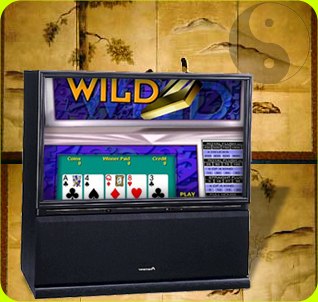
Iwas at my favorite pub the other night, tormenting a videopoker machine with my video-crack-Zen practice, when Daniel Finnigan sat on a stool next to me and interrupted my communion with Nothingness. Daniel is a painter and has, therefore, certain ideas of his own about meditation and spiritual practice. He believes in watching television.
Normally, I would have curtly disposed of anyone who got between my randomness and my handing over money to the Mafia, but Daniel doesn't often reveal his philosophy, so I deigned to listen while still shoving dollar bills into the Maw of the Infinite Godfather.
"You don't know how to watch television," Daniel accused me right off the bat, and I had to concede somewhat. I have watched television. It was not a good experience. People came on and bored me. There were moving cars. Bad jokes. Silicone breasts. Pat Robertson. A goofy cartoon. Television, I decided, was a dispenser of mad-cow-disease-like-viruses that eat your brain.
"Nothing could be farther from the truth!" Daniel exploded. "You cannot watch and judge! That's some kind of '60s intellectual disease that will keep you ego-centered and uninspired." The way you watch television, Daniel explained, is to watch continually for something like twelve hours. You bathe in the medium, you don't judge for content and you don't, especially, use words like "bad" and "good." Television is beyond good and evil, it just is.
Painter that he is, Daniel didn't even bother to stress that the medium is made out of pictures. That goes without saying.
"Well, maybe," I said, while shoving my last five into the Godfather's vest pocket, "but you're not so pure yourself, because here you are evangelizing about something you claim you shouldn't ever judge. I bet that there are a million slacker kids out there in the wasteland they call America, who have watched more television with less judgment than you have. According to your theory, they are a hell of a lot more enlightened than you are."
Of course, you don't use words like enlightenment around Daniel, because they remind him of the '60s. But he had to concede that having friends like myself or Dave Brinks and Andrea Garland, who are poets, he finds himself having to preach the benefits of non-judgmental television watching, despite the fact that it alters the purity of the experience.
I, on the other hand, have chosen a much simpler screen for my spiritual development. The videopoker screen, unlike television, doesn't distress the mind with a variety of pictures and a babble of voices. The VPM just rolls mindless numbers until your eyes are glazed and whatever thoughts you ever had spill out like so much trivial sweat. After about six hours of giving yourself to the pure numbing otherness of the cipher, you are cleansed. And cleaned out, too. Not a shred of ego or cash remain clinging to your person. We used to call that satori, or enlightenment, but in deference to Daniel's generation, I am willing to call it Vacuity. The Grand Vacuity.
There is a difference, of course, between VP Zen and TV Zen. TV is cheaper. But in the end, they both lead you to the same place: the Luminous Nowhere, the Numen, the No One Place.
Gambling is legal in Louisiana, as is the Devil.
Andrei Codrescu is the editor of Exquisite Corpse: A Journal of Letters & Life, now online at www.corpse.org.
Bad Byte appears every other Tuesday on GettingIt.
